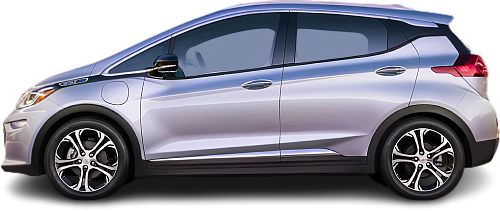USA EV Comparison: BMW i4 M50 vs Chevrolet Bolt EV Gen 1
Struggling to Decide? Let AI Help!
Your AI Summary Is Ready!
General Info
Since both vehicles have been discontinued, they are now only available on the used car market. You can get the BMW i4 M50 (2021-2024) for as low as $36990, while the Chevrolet Bolt EV Gen 1 (2017-2019) begins at $6995.
The BMW i4 M50 (2021-2024) is a Liftback, whereas the Chevrolet Bolt EV Gen 1 (2017-2019) is a Hatchback.
| Property | BMW i4 M50 | Chevrolet Bolt EV Gen 1 |
|---|---|---|
| Years of Production | 2021-2024 | 2017-2019 |
| Current Status | Discontinued | Discontinued |
| Country of Manufacture | Germany | USA |
| Body Style | Liftback | Hatchback |
| Market Availability | EU, USA | USA |
| Price USA (Used) | $36990 | $6995 |
| GCC Score | 6.5 | 5.1 |
Range and Efficiency
While the BMW i4 M50 (2021-2024) offers a longer real-world range and a bigger battery, it is less energy-efficient than the Chevrolet Bolt EV Gen 1 (2017-2019).
| Property | BMW i4 M50 | Chevrolet Bolt EV Gen 1 |
|---|---|---|
| Range (EPA) | 270 mi | 238 mi |
| Range (WLTP) | 322 mi | - Range (WLTP) |
| Range (GCC) | 254 mi | 226 mi |
| Battery Capacity (Nominal) | 83.9 kWh | 60 kWh |
| Battery Capacity (Usable) | 80.7 kWh | 57 kWh |
| Efficiency per 100 mi | 31.8 kWh/100 mi | 25.2 kWh/100 mi |
| Efficiency per kWh | 3.15 mi/kWh | 3.96 mi/kWh |
| Range and Efficiency Score | 6.5 | 7.1 |
Charging
Both vehicles utilize a standard 400-volt architecture.
The BMW i4 M50 (2021-2024) offers faster charging speeds at DC stations, reaching up to 207 kW, while the Chevrolet Bolt EV Gen 1 (2017-2019) maxes out at 50 kW.
The BMW i4 M50 (2021-2024) features a more powerful on-board charger, supporting a maximum AC charging power of 11 kW, whereas the Chevrolet Bolt EV Gen 1 (2017-2019) is limited to 7.2 kW.
| Property | BMW i4 M50 | Chevrolet Bolt EV Gen 1 |
|---|---|---|
| Max Charging Power (AC) | 11 kW | 7.2 kW |
| Max Charging Power (DC) | 207 kW | 50 kW |
| Architecture | 400 V | 400 V |
| Charge Port | CCS Type 1 | CCS Type 1 |
| Charging Score | 6.9 | 4.3 |
Performance
The Chevrolet Bolt EV Gen 1 (2017-2019) is front-wheel drive, while the BMW i4 M50 (2021-2024) offers an all-wheel drive system.
The BMW i4 M50 (2021-2024) boasts greater motor power and accelerates faster from 0 to 60 mph.
| Property | BMW i4 M50 | Chevrolet Bolt EV Gen 1 |
|---|---|---|
| Drive Type | AWD | FWD |
| Motor Type | PMSM (front), PMSM (rear) | PMSM |
| Motor Power (kW) | 400 kW | 150 kW |
| Motor Power (hp) | 536 hp | 201 hp |
| Motor Torque | 586 lb-ft | 266 lb-ft |
| 0-60 mph | 3.7 s | 6.9 s |
| Top Speed | 140 mph | 91 mph |
| Performance Score | 6.8 | 3.5 |
Dimensions
The BMW i4 M50 (2021-2024) is longer and wider, but the Chevrolet Bolt EV Gen 1 (2017-2019) is taller.
The BMW i4 M50 (2021-2024) boasts a more extended wheelbase.
| Property | BMW i4 M50 | Chevrolet Bolt EV Gen 1 |
|---|---|---|
| Length | 188.3 in | 164 in |
| Width (with Mirrors) | 81.6 in | 80.3 in |
| Width (w/o Mirrors) | 72.9 in | 69.5 in |
| Height | 57 in | 62.8 in |
| Wheelbase | 112.4 in | 102.4 in |
Cargo and Towing
The Chevrolet Bolt EV Gen 1 (2017-2019) provides more cargo capacity, featuring both a larger trunk and more space with the rear seats folded.
Neither car is equipped with a frunk (front trunk).
The BMW i4 M50 (2021-2024) has a towing capacity of up to 3500 lb, whereas the Chevrolet Bolt EV Gen 1 (2017-2019) is not officially rated for towing in the US.
| Property | BMW i4 M50 | Chevrolet Bolt EV Gen 1 |
|---|---|---|
| Number of Seats | 5 | 5 |
| Curb Weight | 5018 lb | 3580 lb |
| Cargo Volume (Trunk) | 16.6 ft3 | 16.9 ft3 |
| Cargo Volume (Max) | 45.6 ft3 | 56.6 ft3 |
| Cargo Volume (Frunk) | - Cargo Volume (Frunk) | - Cargo Volume (Frunk) |
| Towing Capacity | 3500 lb | - Towing Capacity |
| Cargo and Towing Score | 5 | 4.7 |




